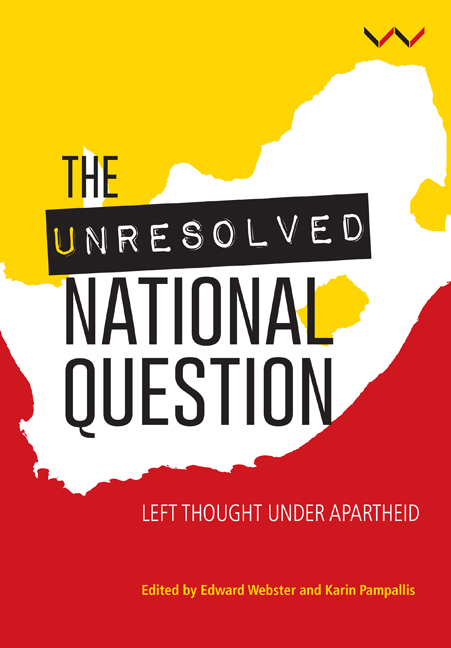Book contents
- Frontmatter
- Contents
- Acronyms and Abbreviations
- Preface: Edward Webster and Karin Pampallis
- Introduction: Revisiting the National Question
- PART ONE KEY FOUNDATIONAL TRADITIONS
- PART TWO CONTINUITY AND RUPTURE
- Chapter 6 Vicissitudes of the National Question: Afrikaner Style
- Chapter 7 Neville Alexander and the National Question
- Chapter 8 The Marxist Workers’ Tendency of the African National Congress
- Chapter 9 The National Question confronts the Ethnic Question
- Chapter 10 Variations on a Zulu Theme
- Chapter 11 Black Consciousness as Nationalism of a Special Type
- Chapter 12 Postponing the National Question: Feminism and the Women's Movement
- Chapter 13 Workerists and the National Question
- Chapter 14 Red, Black and Gold: FOSATU, South African ‘Workerism’, Syndicalism and the Nation
- Chapter 15 National Democratic Revolution meets Constitutional Democracy
- Biographical Notes
- Index
Chapter 10 - Variations on a Zulu Theme
from PART TWO - CONTINUITY AND RUPTURE
Published online by Cambridge University Press: 21 April 2018
- Frontmatter
- Contents
- Acronyms and Abbreviations
- Preface: Edward Webster and Karin Pampallis
- Introduction: Revisiting the National Question
- PART ONE KEY FOUNDATIONAL TRADITIONS
- PART TWO CONTINUITY AND RUPTURE
- Chapter 6 Vicissitudes of the National Question: Afrikaner Style
- Chapter 7 Neville Alexander and the National Question
- Chapter 8 The Marxist Workers’ Tendency of the African National Congress
- Chapter 9 The National Question confronts the Ethnic Question
- Chapter 10 Variations on a Zulu Theme
- Chapter 11 Black Consciousness as Nationalism of a Special Type
- Chapter 12 Postponing the National Question: Feminism and the Women's Movement
- Chapter 13 Workerists and the National Question
- Chapter 14 Red, Black and Gold: FOSATU, South African ‘Workerism’, Syndicalism and the Nation
- Chapter 15 National Democratic Revolution meets Constitutional Democracy
- Biographical Notes
- Index
Summary
There is a scientific and political imperative to stop thinking that a national consciousness is a deficit, some ‘misrecognition’ of interest or a distorted ideology. The historical idea of a belonging, a ‘horizontal solidarity’ to use Benedict Anderson's (1991) formulation, with its weaving together of territories, traditions and experience, is not as ancient as its narratives claim but it is a product of nation states and of hegemonic projects within specific boundaries. It received unique formulations in the colonial period of the late nineteenth century, particularly in racially structured settler societies such as South Africa's.
It is rather more to the point to ask what kind of consciousness it is, what its inflections are, and how it facilitates the emergence of non-racialism, anti-racism and class consciousness. By ‘inflection’ I mean that the national or horizontal comradeships it created differ in space and time: Cabral's articulation of the National Question is not Mobutu's, and what was articulated in African Claims in 1943 was not exactly what is being articulated now (Sitas, 1990; Hart, 2013).
Similarly, such horizontal solidarities are not merely a reaction to a structural constraint. There were many such constraints in the creation of South Africa's capitalist society: native reserves in the 1870s, pass laws in the 1880s, taxes culminating in the Poll Tax by the 1900s, the Union of South Africa and the Land Act by the 1910s, the Native Urban Areas Act and the Industrial Conciliation Act by the 1920s (Saul, 1979; Wolpe, 1990; Legassick, 1995; Mamdani, 1996; Guy, 1999) – all these cohered to define and construct the ‘native’, and as this construction was also ‘tribal’ the native's ethnicity was always at issue. Yes, such constraints were vital, but agency was and is important: it is equally vital to understand the emergence of the ‘national idea’ as an active, creative and ideomorphic narrative by those who were considered to be natives, and how these narratives came to use the jargon, a ‘metanarrative’ that is transmitted inter-generationally (Sitas, 2010). There is no one correct articulation of the ‘national’.
- Type
- Chapter
- Information
- The Unresolved National Question in South AfricaLeft Thought Under Apartheid, pp. 181 - 198Publisher: Wits University PressPrint publication year: 2017



